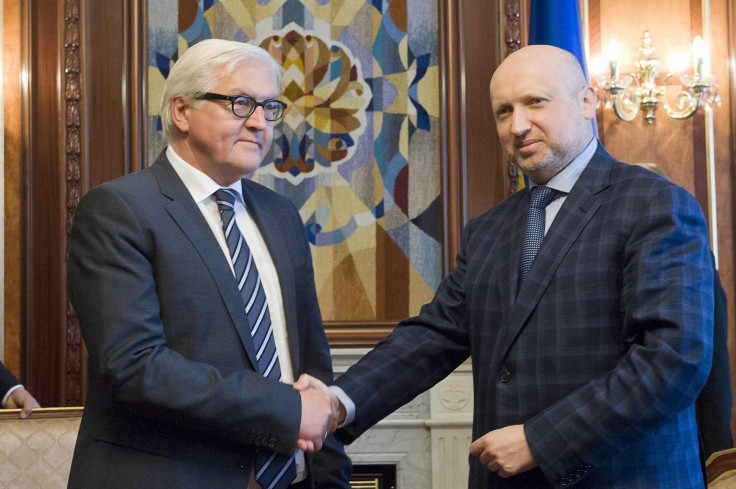Ukraine Reluctantly Agrees To Host National Unity Talks With Moscow

After one of the deadliest clashes in eastern Ukraine Tuesday where six soldiers were killed in an insurgent ambush, the Ukrainian government has reluctantly agreed to talks brokered by the Organization of Security and Cooperation in Europe, a security and rights group that includes Russia and the U.S.
The discussions will center on a possible peace plan, which includes a dialogue on decentralizing Ukraine's government. While Russia supported the plan, both Ukraine’s leadership and the U.S. are skeptical.
Arseniy Yatsenyuk, Ukraine’s acting prime minister, will chair the first in a series of meetings, which begin at 4:30 p.m. Wednesday local time, and will include national MPs, government figures and regional officials in line with proposals drafted by the OSCE. Pro-Russian separatists will not attend the meeting after the Ukrainian government said it will refuse to hold talks with groups who have “blood on their hands.”
Wednesday’s talks will focus on Ukraine’s political future. While some separatists have called for Russian annexation of the eastern part of the country as in Crimea, others are pushing for a federal system that would grant more autonomy to regional governors.
German Foreign Minister Frank-Walter Steinmeier flew to Ukraine on Tuesday to help jumpstart the talks between the central government and pro-Russia separatists – the first step would be to implement a "road map" drafted by the OSCE.
A senior official in the Obama administration told The Associated Press that the U.S. had been coordinating with Germany to resolve the Ukraine crisis diplomatically since tensions between Russia and the U.S. remain high. The official spoke on condition of anonymity, not being authorized to discuss the crisis in public.
Putin "is far more likely to bow to pressure if it's going to come from [German Chancellor] Angela Merkel than Barack Obama," Michael Geary of the Institute for European Global Studies at Switzerland's University of Basel, told AP.
Moscow wants "Russia-backed separatists to have a voice in drafting a new constitution for Ukraine, which essentially means Russia dictating what the constitution should include," Keir Giles, a military analyst at the Chatham House think-tank in London, said.
Yatsenyuk thanked the OSCE for its plan but said Ukraine has its own “road map” to resolve the crisis and the issue should be settled by the Ukrainian people, he said while in Brussels.
Yevhen Perebiynis, a spokesman for Ukraine’s Foreign Ministry, echoed the premier’s statement, adding that Russia’s view of the OSCE “road map” is “far from reality, biased and one-sided.” He accused Russia of supporting the separatists and encouraging conflict in the region.
"The de-escalation of the situation directly depends on whether Russia will stop sponsoring the terrorists, withdraw its troops from the border or whether it will call on terrorists lay down the arms and vacate the building they have seized," Perebiynis said in comments, according to Interfax news agency.
Meanwhile, Russia’s Foreign Ministry accused the Ukrainian government of escalating the conflict. It called on Kiev to withdraw its troops and cease its “punitive actions” as part of the OSCE’s diplomatic solution.
The talks come less than a week after a weekend referendum held by separatists, who said 90 percent of people in the region voted for autonomy from the Ukrainian government. Russia said Ukraine should respect the vote’s result.
The Kiev government hopes that the planned presidential election on May 25 will help unify the country. A Russian parliamentarian said Wednesday the results of that election would not be legitimate.
© Copyright IBTimes 2024. All rights reserved.






















